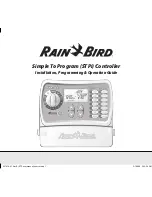
2-16
2. Local Mode Screen
IP Address
This is an address that is used for recognizing each node on the Ethernet and should be unique.
The IP address is 32-bit data which consists of the network address and the host address and can be classified
into classes A to C depending on the network size.
<Notation>
Data consisting of 32 bits is divided into four segments in decimal notation and each segment is delimited
with a period.
Example: The IP address in class C shown below is represented as “192.128.1.50”.
11000000 10000000 00000001 00110010
<Unavailable IP addresses>
• “0” is specified for the first octet.
Example: 0.x.x.x
• “127” is specified for the first octet (loop back address).
Example: 127.x.x.x
• “224” or more is specified for the first octet (for multi-cast or experiment).
Example: 224.x.x.x
• The host address consists of only “0” or “255” (broadcast address).
Example: 128.0.255.255, 192.168.1.0
Port Number
Multiple applications are running on each node, and communications are carried out for each application between
the nodes. Consequently, it is necessary to have a means to identify the application that data should be transferred
to. The port number works as this identifier. Each port number is 16-bit data (from 0 to 65535).
The V9 series uses ports for screen program transfer (8001), PLC communication (as desired), and the simulator
(8020). Set a unique number in the range of 1024 to 65535. For a PLC or a PC, set the port number in the range of
256 to 65535. It is recommended to set a greater number.
Default Gateway
A gateway and a router are used for communication between different networks.
The IP address of the gateway (router) should be set to communicate with the node(s) on other networks.
Subnet Mask
A subnet mask is used for dividing one network address into multiple networks (subnet).
The subnet is assigned by specifying a part of the host address in the IP address as a subnet address.
<Unavailable subnet masks>
• All bits are set to “0”. ... 0.0.0.0
• All bits are set to “1”. ... 255.255.255.255
0
1 0
1 1 0
Class A
Class B
Class C
Network address
(7)
Host address (8)
Host address (24)
Network address (14)
Host address (16)
Network address (14)
255.
255.
255.
0
1 0
11111111
11111111
11111111
00000000
Class B
Subnet Mask
Host address (16)
Network address
Subnet address
Network address (14)
Host address
















































